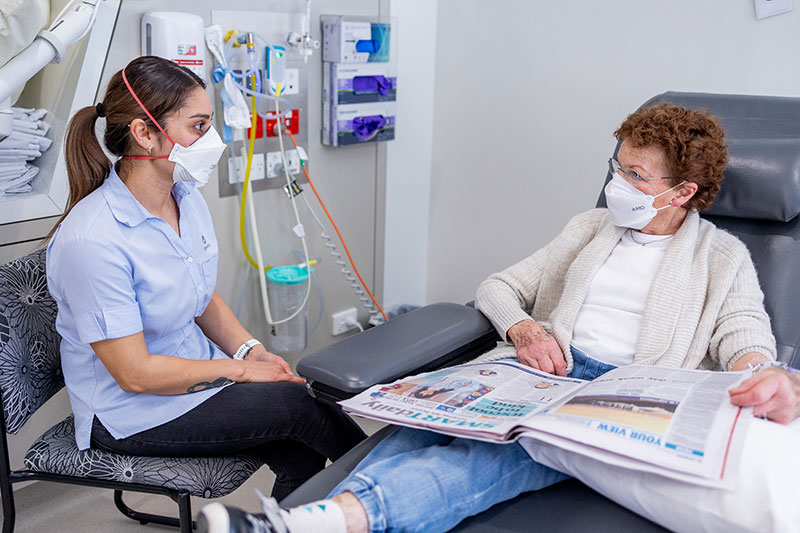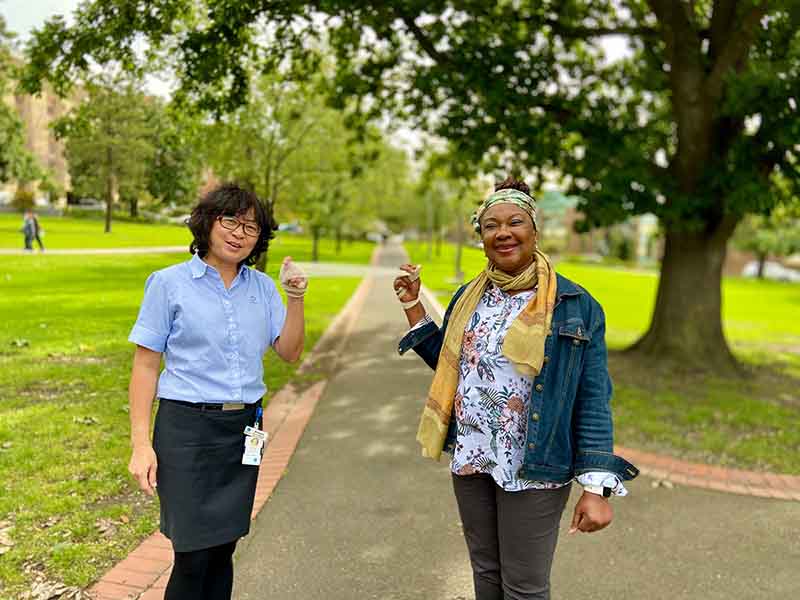What is the Women's Health Unit at Epworth?
Our Women's Health Unit team are highly skilled in the treatment and care of women with gynaecological cancers. The Medical Specialists, Gynaecological Clinical Nurse Consultant, Allied Health and Ward staff work closely with patients and families providing expertise, education, and support at this challenging and stressful time.-
What is uterine cancer?
Cancer of the uterus is a type of gynaecological cancer. Uterine cancer grows from abnormal cells in the lining of the uterus (the endometrium) or the muscle layer (the myometrium). There are two main types of uterine cancer:
1. Endometrial cancer which begins in the lining of the uterus. Endometrial cancers are further divided into adenocarcinomas, adenosquamous carcinomas, serous carcinomas and clear cell carcinomas.
2. Uterine sarcoma which is less common and grows in the myometrial layer. Uterine sarcomas may be one of three types; endometrial stromal sarcoma, Mullerian sarcoma or leiomyosarcomas. -
What roles does genetics play in uterine cancer?
Uterine cancer has been associated with a type of inherited cancer syndrome called Lynch Syndrome, also called hereditary non-polyposis colorectal cancer (HNPCC). Faults in one of the genes (known as MLH1, MSH6 and MSH2) are linked to a predisposition for uterine, bowel and ovarian cancer.
It is recommended that all women with endometrial cancer should have their tumour tested for Lynch syndrome, even if they have no family history of colon cancer or other cancers. The presence of Lynch syndrome has important implications for women and their family members. About 2% to 5% of women with endometrial cancer have Lynch syndrome.
-
What increases the risk of uterine cancer?
- Childbirth
People who have not had children or are unable to have children may be at a higher risk.
- Weight
Being overweight or obese is a significant risk factor.
- Age
More common in women aged over 60.
- Post-menopausal
The risk of developing a type of gynaecological cancer increases if you are over the age of 50 and for women who have stopped menstruating (through menopause).
- Family history
If you have a family history of uterine, colon (bowel) or breast cancer.
- Taking oestrogen hormone replacement without progesterone
- Using the drug Tamoxifen
- Previous pelvic radiation
- Childbirth
Signs and symptoms
It’s natural and common for changes to occur to your body as you age and remember all changes aren't due to cancer. However, we encourage you to recognise what is normal for your body and, if changes are persistent, speak with your GP for peace of mind.
Symptoms of uterine cancer:
- Bleeding or spotting post-menopause
- Abdominal pain, bloating
- Abnormal vaginal discharge
- Heavier periods than usual
- Difficulty urinating
- Pain during intercourse
Epworth fact sheet | Uterine cancer
Notice changes and act quickly
Diagnosis
Epworth uses a range of diagnostic tests to thoroughly investigate signs and symptoms of underlying health concerns.
Below is an overview of common tests used to diagnose uterine cancer.
Physical examination
Your GP or specialist may perform a general physical examination to understand your current health. This may include an internal pelvic examination.
Blood test
Your doctor may order several blood tests to check your overall health and to detect proteins produced by cancer cells. These proteins are called tumour markers.
Ultrasound
An ultrasound may be one of the first tests you encounter following a blood test and physical exam. Your doctor may recommend an abdominal and/or a transvaginal ultrasound.
- Abdominal ultrasound
The sonographer moves a small device (transducer) over your abdominal area.
- Transvaginal ultrasound
A small transducer wand is inserted into the vagina to provide a clearer picture of both ovaries, uterus, bladder and bowel.
Fluid aspiration
A fine tube is placed into the abdomen to collect fluid which is checked under the microscope for cancer cells. A local anaesthetic is given to avoid pain.
Hysteroscopy and Biopsy
A biopsy will allow your care team to confirm whether you have uterine cancer. Tissue samples are taken and looked at under a microscope to determine if cancer cells are present.
Staging - Investigating the extent of the cancer
During your initial diagnostic tests, your care team may be able to stage your cancer at the same time during a biopsy or ultrasound.
What does my cancer stage mean?
Staging is a term used to describe the size of the cancer and whether it has spread. Staging helps your care team and specialists to create a unique treatment plan.
Stage 1
Early cancer where the tumour is relatively small and the cancer has not yet spread to other tissue.
Stage 2
Cancerous tumour remains relatively localised but has spread to nearby tissue beyond its origin, such as the cervix.
Stage 3
Cancer has spread regionally and affected surrounding tissue, such as the ovaries, fallopian tubes, vagina or lymph nodes.
Stage 4
Sometimes called advanced cancer, stage 4 means cancer has spread to other tissue or organs beyond the region where it originated, such as the bladder or rectum.
Grading
Grading refers to whether the cancer cells look fairly normal and behave like healthy cells or whether they look very abnormal and are growing rapidly.
Find your Epworth gynaecological cancer specialist
View our gynaecologists and medical oncologists with a sub-specialty in gynaecological cancers (cervical, ovarian, uterine and vaginal and vulvar cancer).
Treatment
Why choose Epworth for cancer care?
Epworth HealthCare is Victoria's largest not-for-profit private hospital group. As a not-for-profit, we use our revenue to reinvest in our people, training and facilities. This allows our hospitals to be renowned for excellence in cancer diagnosis, treatment, rehabilitation and care for our patients and their families.Treatment overview
Depending on the stage of your cancer, your treatment team may recommend surgery, chemotherapy, or hormone therapy. Some cancers are cured with surgery alone and others require a combination of treatments.
- Targeted therapies
Targeted therapies are the use of drugs to attack specific weaknesses in cancer cells, killing the cells to prevent the cancer growing.
- Radiotherapy
Radiotherapy is the use of radiation (X-rays) to kill or injure cancer cells.
Learn more
- Chemotherapy
Chemotherapy is a common form of treatment that involves the use of anti-cancer drugs to kill or slow the growth of cancer cells. Chemotherapy is often used alongside other treatments such as radiotherapy and surgery.
Learn more
- Surgery
Surgery is often first line treatment for uterine cancer that has not spread beyond the uterus. Our oncologists perform more than 1,000 major gynaecological cancer operations each year and are leading experts in this field.
Learn more
Multidisciplinary Team (MDT) Assessment and Plan of Treatment
You will have access to an MDT to plan the management of your cancer. All members of the MDT have a special interest in gynaecological cancer, and include:
- Gynaecological oncologists
- Medical oncologists
- Radiation oncologists
- Gynaecology clinical nurse specialists/oncology liaison nurse
- Gynaecology histopathologists/cytologists
- Physiotherapists
- Radiologists
- Research staff
- Genetics counsellors
- Social workers
- Psychiatrist/psychologist
- Pastoral Care
- Rehabilitation team
Surgery
Why choose Epworth to perform cancer surgery?
Our gynaecological oncologists perform more than 1,000 major gynaecological cancer operations each year. Epworth was the first private hospital group in Victoria to treat gynaecological cancers using robot-assisted surgery.
Types of uterine cancer surgery:
- Total hysterectomy
This is a surgery to remove the uterus, including the cervix. Depending on the where the cancer has grown, the fallopian tubes and ovaries may also be removed. This is the most common surgical procedure for treating uterine cancer.
- Radical hysterectomy
This is a more extensive surgery that involves removing the uterus, cervix, the upper part of the vagina, and the tissues around these structures. This procedure is typically reserved for cases of advanced uterine cancer.
- Lymphadenectomy
During a lymphadenectomy the lymph nodes are removed from the pelvis and abdomen to check if the cancer has spread beyond the uterus. This surgery often done at the same time as a hysterectomy.
Radiotherapy
Epworth oncologists use radiation to cure, control and reduce gynaecological cancer cells for our patients.
Radiotherapy at Epworth
Epworth offers patients radiotherapy through our provider, Icon. As Australia’s largest dedicated cancer care provider, Icon has a long history of delivering exceptional cancer care to the Australian community.
Supported by the latest world-class technology and evidence-based techniques, Icon’s highly experienced team of radiation oncologists, radiation therapists, physicists and nurses are committed to providing compassionate, exceptional care for patients and their loved ones.
What are the side effects of radiotherapy?
Side effect types and duration will vary from person to person. Some general side effects may include:
- Fatigue
- Skin irritation
- Feeling weak
- A stinging sensation when urinating
- Diarrhoea
Chemotherapy
Your medical oncologist will oversee your chemotherapy. These specialists work closely with surgeons, radiation oncologists, physicians, nurses, and allied health professionals to ensure that all elements of your care are coordinated.
Your medical oncologist will explain and discuss current treatment recommendations and the opportunity to participate in appropriate clinical trials.
How will I receive my treatment?
The treatment can be given orally, through an intravenous cannula, direct introduction to the affected organ/tissue or as a cream. Chemotherapy is often given in courses or cycles with periods of rest in between, allowing normal cells to recover.
Are there different types of chemotherapy?
Yes, there are many different types of chemotherapy. Your care team will explain which chemotherapy is best for your circumstance.
What are the side effects of chemotherapy?
Our team is here to support you throughout your cancer journey and will help you prevent and manage these potential and often temporary side effects.
Side effects may include:
- Nausea and vomiting
- Diarrhoea or constipation
- Fatigue
- Hair loss
- Muscle weakness
- Skin sensitivity to sunlight
- Loss of appetite
Epworth Wig salons
Head wear and wigs are offered to all Epworth patients experiencing hair loss at our convenient on-site salons. This service is provided via the generosity of our Epworth Medical Foundation donors so there is no cost to patients.
How do I prepare for chemotherapy?
- The Gynae Clinical Nurse Consultant and Oncology Liaison Nurse Consultant will provide education and a support pack for your information and explain the chemotherapy process.
- You may be able to use “cold caps” to prevent hair loss or may like to be fitted for a wig prior to starting chemotherapy in case you need it.
- Recovering from surgery, eating well, staying well hydrated, sleeping and exercising will all play a part in preparing for chemotherapy.
- You may choose to have your chemotherapy at one of Epworth’s Day Oncology Units or a unit closer to your home.
- If you have children or grandchildren from babies to age 18, you may like to read the Cancer Council book: Talking to Kids About Cancer. The ward team can provide a copy.
Epworth cancer care locations
Rehabilitation with Epworth
Uterine cancer locations:
Uterine cancer rehabilitation
Rehabilitation doesn't just start after your treatment has ended. You may benefit from our holistic rehabilitation programs at any time throughout your cancer journey. Our programs support you to physically and emotionally prepare for treatment or restore your strength and wellbeing.Overview
Epworth offers patients programs to support their wellbeing before, during and after treatment. We believe this approach allows our patients to feel best prepared for treatment or feel more like themselves following surgery or other medical interventions.Who is the program for?
Our cancer rehabilitation program is designed for anyone diagnosed with gynaecological cancer at any time from diagnosis to treatment and recovery.What does the cancer rehabilitation program involve?
Before you start
You will meet a rehabilitation doctor and allied health team for a medical, psychosocial, and physical assessment.
Everyone's cancer care journey is different. The assessments will help the team understand your specific needs to develop the right program for you. You will work with the team to develop goals to work towards throughout the program.
During the program
Depending on your assessment and individual needs, you may complete your program:
- as part of a group, with other people, who have been diagnosed with varying cancers
- on your own, one to one with the rehab team members.
A typical program may involve:
Most people will attend as an outpatient, coming to hospital for a few hours once or twice a week, over several weeks. Some people may need to stay overnight in hospital and complete a program over several consecutive days.
Either way, you will receive the same support from our team to address your physical, functional and emotional needs.
Your rehabilitation program may focus on the following:
- A physical exercise component to help restore movement, strength and fitness.
- An educational component where you will learn about different areas associated with your cancer diagnosis and treatment and how to manage them, including:
- fatigue
- pain
- emotional wellbeing
- body image and self-esteem
- work or family challenges
- relationships
- late-onset of side effects.
At the end of your program
Our rehabilitation team will keep in touch with your referring doctor and/or treating team throughout the program and will let them know how you went at the end.
They will also connect you to local services and support networks so you can leave the program with strength and confidence to live life to your fullest potential.
Who will support me during the rehabilitation program?
Depending on your needs, you may see some or all of our multidisciplinary team which includes:
- Rehabilitation specialist doctor
- Cancer nurse
- Exercise physiologist
- Physiotherapist
- Psychologist
- Social worker
- Occupational therapist
- Dietitian.
How can I access a rehabilitation program?
Referrals
A referral from your specialist or GP is required to participate.
Ask your doctor to complete the referral form at www.epworth.org.au/rehab and return it to us via fax: 03 9982 6696 or email: [email protected]
Locations
Group programs are located at Epworth Camberwell and Epworth Hawthorn.
Individual programs can be accessed at Epworth Brighton, Epworth Camberwell, Epworth Geelong, Epworth Hawthorn or Epworth Richmond Rehabilitation.
Contact us
If you have any questions about our cancer rehabilitation programs, call us on: 1300 345 600.
Life after treatment
Life after cancer treatment can pose its own challenges but our Epworth specialists are here to support you.Life after cancer treatment can be a mixture of emotions. You may not 'bounce back' as quickly as you expected to, but be kind to yourself.
Remember that:
- You may still feel fatigued after finishing treatment.
- You may like to make an advanced care plan with the assistance of our social worker. We encourage you to speak with your care team to learn more.
- Ask for help. If your body has changed due to treatment, remember help is out there to support you to feel your best and regain your sense of identity and self-esteem.
- Speak with your care team about options to support your general wellbeing after treatment. The Cancer Council provide a free telephone intimacy counselling service (13 11 20). Your care team can also make referrals to sexual counsellors, menopause, fertility and lymphoedema experts.
Follow-up appointments
Epworth patients in remission for gynaecological cancer will have follow up appointments every three months, alternating between surgical and oncology specialists. This will also involve tumour marker blood tests and imaging, such as PET or CT scans.
Managing your health and wellbeing ongoing
Knowing how to best manage your wellbeing ongoing is an essential step toward recovery. We encourage people who have been living with uterine cancer to stay active, eat healthy foods, sleep well and enjoy your post treatment life.
You may like to explore different ways to relax, such as meditation, yoga or massage.
The Memorial Sloan Kettering Cancer Centre (New York) website has many useful online videos about adjusting to life after cancer, with useful dietary and lifestyle advice.
Find your Epworth gynaecological cancer specialist
View our gynaecologists and medical oncologists with a sub-specialty in gynaecological cancers (cervical, ovarian, uterine and vaginal and vulvar cancer).


